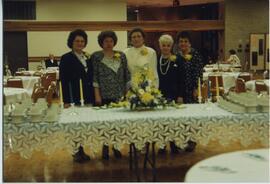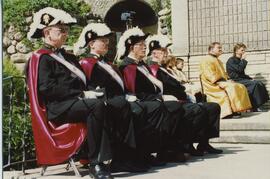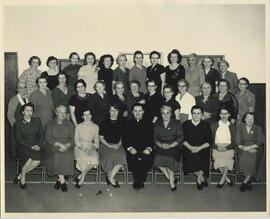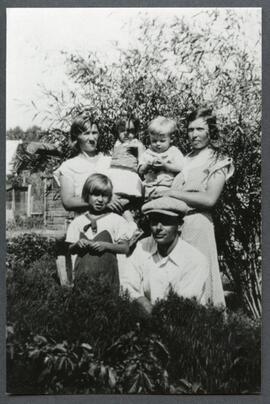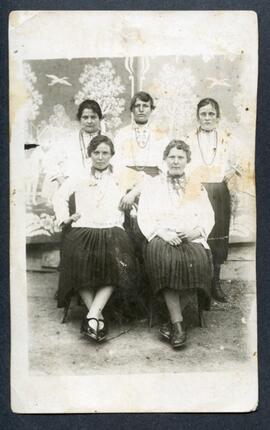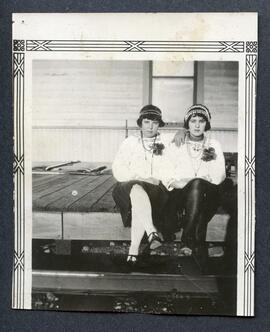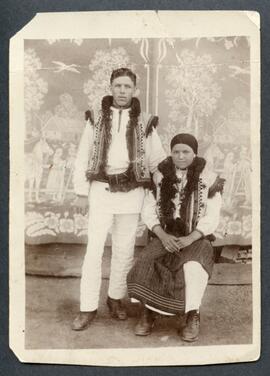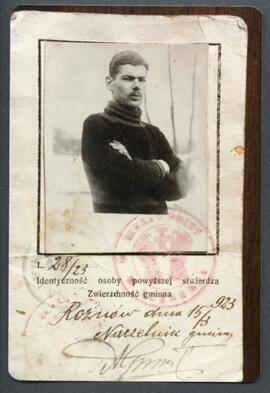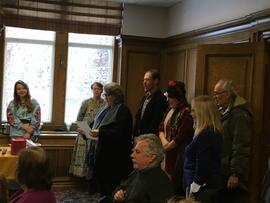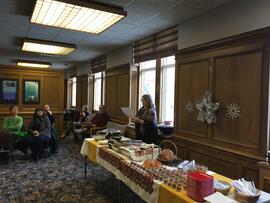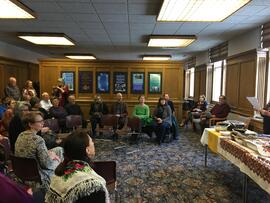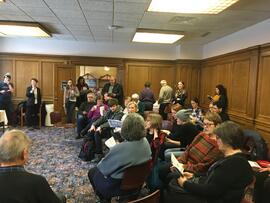Ukrainian Catholic Women's League of Canada "Goodwill Club" Millennium Tea March 27, 1988 St. Josephat's Parish Hall "Verchovyna"
Icon Display
Convenors: Emilia Zarsky
Stephania Chyzowsky
Pres: Mary Semkow
Mary Kupowycki
Ann Musick
Inscription on back:
"At the Grotta Mundare 1991"
Photograph of Paranchych family. Back left is the wife of Tom Paranchych holding her daughter. Back right is Alex Paranchych’s wife holding Tom Paranchych’s son. Front left is Tom Paranchych’s oldest daughter. Front right, kneeling, is Alex Paranchych.
Photo taken of Fred Paranchych’s mother, Annie Troich, with sister Arlene and neighbours in Roznov prior to emigration to Tofield, Alberta. Photo was developed in Ukraine and mailed to Annie after she moved. Annie is sitting in the front row, on the the left.
Photograph of Annie Troich and her cousin, Mrs. Yukobaski in Tofield, Alberta.
Photograph of Fred Paranchych’s aunt and uncle in Roznov, Ukraine.
Photograph of Mr Troich (centre, front), Annie Troich (right, front). The child on Annie’s lap does not belong to her. Annie’s father (centre, front).
Copy of Alex Paranchych’s father’s passport.
Canadian Institute of Ukrainian Studies are offering traditional Ukrainian Christmas greetings (Halyna Klid, Oleksii Polegkyi, Larysa Bilous, Larysa Buriak, and Bohdan Klid). Standing at the window are Nataliya Bezborodova and Jelena Pogosjan. Sitting in front is Peter Melnycky.
Lynnien Pawluk, Kule Folklore Centre's Administrator, is delivering a presentation on Ukrainian Christmas traditions.
Guests are listening to the presentation by Lynnien Pawluk.
MLCS Chair Dr. Carry Smith offering her greetings.
This item contains two interviews with unknown females. The first interviewee was born in Russia in 1909. She talks about the place where she lived and family members that were starving and being deported to Siberia. She then talks about coming to Canada and what she and her husband did in Canada. She talks about the church and being Lutheran and Evangelic.
The second interviewee's parents came from Poland and she was raised in a Lutheran family. Her family left to Ukraine and then came to Canada in 1927 and moved to Alberta in 1928.
The tape also contains music recordings
This item is a recording of a CEESSA meeting. Content includes:
Deciding on the day of election: Thursday, April 27 at 7:30
Difference between academic community and society – the society can do many more things.
Official name – CEESSA
Applause
Only 5 mins of sound
This item is a recording of a meeting discussing the logistics of the Central and Eastern European society. At this meeting the society was formally established and committees were created.
Continuation of presentation by Dr. Sukoversky: Continues story about community engagement with the public library. On the question of liaison groups: it’s up to the ethnic groups, they have their own organizations and should get in touch, it’s not the university’s job.
Mr. Kostash: The usefulness of the University Senate come in two areas: monitoring the academic things going on in the university and ensuring there’s no favoritism in programs. Private organizations have a responsibility to ensure that funds are being allocated intelligently and efficiently. Some things don’t require the demanding funds when they can be done at better times or in better ways.
Unknown speaker: Publications should be released with the contacts of liaisons that can be contacted between ethnic communities and publications.
Unknown speaker: The community should help the division to find ways to release the kinds of publications that the community desires.
Presentation by Mr. Kistner: Wasn’t prepared to present but is talking from the perspective of a foot soldier. He is Baltic German born in Tallinn Estonia. Talks about how maps often forget about the islands of Estonia. Baltic Germans is a very small group. It’s worthwhile for even very small groups to write their history and preserve their heritage. In doing work there’s lots of assistance needed, time, and footwork. Being a small group has its advantages, no need for sampling.
Open Session
Professor Rolland: University officials are just paid assistance, to help the community to spread unbiased facts about people from Eastern Europe. Funding, publishing, liaison, money, structure. What good is a building without anyone in it? Being asked many tasks, but we ask you where are the people we are supposed to be teaching? Where is the interest in the young people? A severe lack of numbers in the classroom.
Unknown speaker: Many high school trips go to the UK and France, but none go to Eastern Europe, there’s no interest in a country if they’ve never been to it.
Unknown speaker: Primary teachers don’t get enough information about Eastern Europe, very early interest cannot be built. There’s a marvelous library and studies that are unknown to the public, and inaccessible. If a pride cannot be instilled in Canadian Pluralism, then numbers will remain low, and ignorance will prevail.
This is a mutual affair, if the division is to serve the community, it must go above the head of the faculty of extension, the faculty of extension doesn’t cover all they community’s needs.
Unknown Speaker: A course was offered, in which every means at the university’s disposal was used, still only had 12 enrolled. Not enough to satisfy the university. UKR 320, only 1 student enrolled.
Mike Torman: One reason for low enrollment: very utilitarian society, if a course doesn’t offer something ‘useful’ it won’t be taken. Languages are very disciplined subjects, it takes a highly disciplined student to learn them.
Unknown speaker: Motivation is extremely important, advertising isn’t enough. The travel course it a really good thing. The generosity of the community, the province, made starting new programs easier, even when the province was much poorer. The community must do its share to promote the material basis of the division. If the division is to prosper, this is what we need. The end product is service to the community. [The recording cuts out]
This item is a recording of an interview conducted with Maria von Rosenbach, the daughter of Colonel Orest Durnovol, a writer and philosopher. He wrote a book in Russia, but his interpretation of religion was different than the State's and was therefore forbidden. This book was published in 1913 in Germany. The family left Russia in 1918 and Maria discusses this journey in the interview. She talks about her life and meeting her husband. Her family's occupations during the Depression are also discussed.
Rosenbach, Maria von